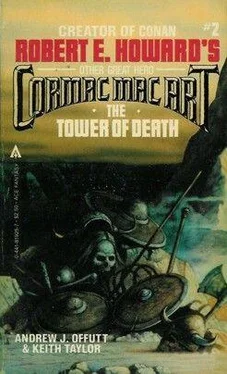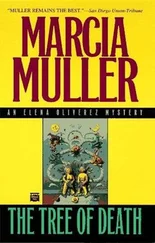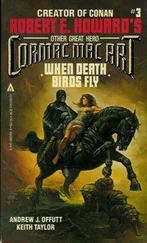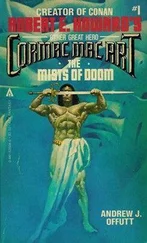Andrew Offutt - The Tower of Death
Здесь есть возможность читать онлайн «Andrew Offutt - The Tower of Death» весь текст электронной книги совершенно бесплатно (целиком полную версию без сокращений). В некоторых случаях можно слушать аудио, скачать через торрент в формате fb2 и присутствует краткое содержание. Жанр: Фэнтези, на английском языке. Описание произведения, (предисловие) а так же отзывы посетителей доступны на портале библиотеки ЛибКат.
- Название:The Tower of Death
- Автор:
- Жанр:
- Год:неизвестен
- ISBN:нет данных
- Рейтинг книги:3 / 5. Голосов: 1
-
Избранное:Добавить в избранное
- Отзывы:
-
Ваша оценка:
- 60
- 1
- 2
- 3
- 4
- 5
The Tower of Death: краткое содержание, описание и аннотация
Предлагаем к чтению аннотацию, описание, краткое содержание или предисловие (зависит от того, что написал сам автор книги «The Tower of Death»). Если вы не нашли необходимую информацию о книге — напишите в комментариях, мы постараемся отыскать её.
The Tower of Death — читать онлайн бесплатно полную книгу (весь текст) целиком
Ниже представлен текст книги, разбитый по страницам. Система сохранения места последней прочитанной страницы, позволяет с удобством читать онлайн бесплатно книгу «The Tower of Death», без необходимости каждый раз заново искать на чём Вы остановились. Поставьте закладку, и сможете в любой момент перейти на страницу, на которой закончили чтение.
Интервал:
Закладка:
“Look you,” he growled, “we will tarry till night falls or something else occurs. We will keep close watch on Raven , and these fools who think they be guarding her. Suppose dusk is here and no word has come; then we go aboard again, and should any try to prevent us, their women will bewail them. Although… I scarce think it will mean waiting so long as that. Even a city like Brigantium cannot be that deep asleep.” He showed his men a piratical grin.
Jostein gave vent to a jaw-cracking yawn. “Talking of sleep, let us wake in shifts of five, as when we stand night watches. I long to stretch out on soft leaves, and here we have ’em.
The others gave even more ready agreement to that. Wulfhere was astounded. His men must be growing soft. Granted, it had been a strenuous few days, but they had eaten and enjoyed a full night’s sleep, and done naught since save row a mile or two, and talk much. Dane-mark was not breeding them as she once had.
CHAPTER SIX: The King of Galicia
Surrounded by watchful men whose hands rode their pommels as if casually, Cormac mac Art was escorted inland. Aye, there was old Brigantium harbour, another relic of Rome not yet moribund, and here the old city that was, Roman stone looking leprosy-afflicted, peopled by foreigners to these shores. Cormac passed through it without glancing to either side of the crumbling, pitted street. The Gael towered tall, and his helmet with its flowing crest added to his appearance of great height.
Dogs stared at him, quivering in limbs and nostrils, ears cocked forward, quietly rumbling without really growling. A little beast the hue of calf-excrement came on the run, yapping. The swipe of one soldier missed him; the spear-butt of another sent him tumbling while changing his yaps into squeals. The pup fled. Children, too, stared, and their mothers wound protective arms around them from behind-and stared.
I probably look Roman , Cormac mused without humour. It’s been a long time for these people. And since he wore his weapons, the stranger couldn’t be a captive-could he?
“Head straight; look ahead,” the Gael muttered to the woman before him on the plodding dun, and Clodia did. She also stayed very close. He was aware now that he’d taken out much frustration on her.
These were a mixed people, he saw, without distaste for hair of various hues and nigh as many dark eyes as blue and grey; those native to this land so long ago had married-and bred with, without marrying-the Roman conquerors. Now some had mingled their blood too with the Suevi that Constantius the Illyrian had driven into this northwest corner of Hispania. And they stared at the dark, scarred man with the grey eyes and the armour coat of linked chain. Only the burly smith did not stare; he was an ever busy man who but glanced, and went on pounding lest his sheet of yellow-glowing metal cool.
Hail Smith , Cormac thought, and the corners of his thin-lipped mouth twitched as if contemplating a smile. They discarded the notion.
The remnant of Rome ended. The former manse had been all but destroyed; King Veremund had his own keep.
Stony earth from a curving ditch ten or so feet deep was banked on its opposite side, and a single bridge of planking crossed the trench that would do no more than slow mounted attackers. Cormac glanced down at muck, and wrinkled his nose. He and Clodia and their escort crossed over to the sprawling grounds about the king’s hall.
As the king was in truth little more than a tribal chieftain of what anciently had been a confederation rather than a distinct tribe or family group, his dwelling was no palace. Under its thatched roof it was but a large Germanic keep with gable-ends carved ornately into ghastly gryphons and corbels covered with a catenulate design. The fine great door of oak stood open. A weapon-man went forward to draw aside the hanging there: a door-sized sheet of fine softened narwhal. The heavy arras was stamped in an overall pattern with a seal or property mark consisting of three concentric circles centered with a horizontal oval that Cormac saw represented a watchful eye.
He continued with the Clodia masquerade, handing her down and astonishing the dirty rag-tag young woman by stepping aside in manner courtly. After giving him a look she thought austerely highborn, she went in. Cormac, stooping exaggeratedly low, passed into the hall of the king.
Now all must wait in an anteroom or defense-hall whilst Irnic in his scarlet Roman cloak went somewhere within. There were no sentries. Cormac stood easy. He knew that one must ever wait while the wearer of a diadem was apprised of one’s presence. He also knew that a messenger had already galloped here on just that mission, and the Gael prepared himself to dislike the Suevic lord of Galicia.
Nor was there aught unusual in that; mac Art of Eirrin had had nothing good of kings but only treachery-and if there had been good of them too, he’d forgot it because he wanted to do.
The officer returned and Cormac was conducted into the presence of the king.
Others were there of course, the advisers and hangers-on called courtiers who ever clung about thrones. Cormac was careful not to notice them or even the young woman directly beside the high seat. He kept his dispassionate gaze fixed steadily on the man seated atop a two-step dais. He wore a robe dyed brightly in the vermilion hue of the minium brought up from the bed of the nearby River Mino, and its hem was purfled with cloth-of-gold.
He was tallish in the body and short in the leg, neither pale nor dark, neither handsome nor ill-favored. He’d a good brow and big hands. His twisted topknot, brown like his beard and droop-ended mustache, was worn over his right ear so as to accommodate his royal diadem. This was an inch-high band of gold sheet doubtless laid on over bronze plaques. The violet stones called almandines decorated it, with an interesting fleck of winking mica and two fair garnets, dull and lifeless amid the gleaming purple stones, which were convex. His swordbelt, mark of the military men of which he of course was supreme commander, was similarly decorated and the buckle appeared moulded of pure gold, in twisted bands like a fine torc.
Behind him hung a nicely woven tapestry, showing a battle or two and centering on the same eye-in-circles sigil that decorated the door-hanging. Cormac recognized a tall vase as Greek, stolen long and long ago.
Only another minor king, Cormac thought, remembering how Hengist had styled himself “king” in Kentish Britain when the Jutish pirate had but three hundred followers and perhaps a score of horses. The most notable aspect of this one was that he was little older than his visitor, and that he was making no effort to look ferocious. The Gael tried not to be impressed.
“Veremund, Rex Suevorum! ” a voice announced from the king’s left, without bothering to mention Galicia. Cormac didn’t bother to glance at the annunciator.
“Who are you,” King Veremund said, in a baritone that sounded more like a well-controlled tenor. “Why are you come here?”
Rather than answer, Cormac stepped aside and swung a courtly arm out to his companion of the torn skirt. “May I introduce to the lord King of the Sueves the Lady Clodia, of the Roman Kingdom of Soissons, and lately of Tours. Affianced through blackmail of her father to the hideous monster Sigebert One-ear, and now fleeing in quest of protection.”
Ah, Sigebert mine deadly enemy-how ye’d be loving those words-dog!
The king leaned forward. “A Frankish noblewoman, here? Fleeing a legal betrothal arranged by your father, my lady?”
Bad cess , Cormac thought, and only just managed to seem unhasty in his reply: “A betrothal into which her most misfortunate father was scurrilously tricked and forced, my lord King. Indeed, her father is more than pleased that his lady daughter is after escaping the thrice-cruel Sigebert.”
Читать дальшеИнтервал:
Закладка:
Похожие книги на «The Tower of Death»
Представляем Вашему вниманию похожие книги на «The Tower of Death» списком для выбора. Мы отобрали схожую по названию и смыслу литературу в надежде предоставить читателям больше вариантов отыскать новые, интересные, ещё непрочитанные произведения.
Обсуждение, отзывы о книге «The Tower of Death» и просто собственные мнения читателей. Оставьте ваши комментарии, напишите, что Вы думаете о произведении, его смысле или главных героях. Укажите что конкретно понравилось, а что нет, и почему Вы так считаете.












